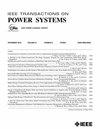Chance Constrained MDP Formulation and Bayesian Advantage Policy Optimization for Stochastic Dynamic Optimal Power Flow
IF 6.5
1区 工程技术
Q1 ENGINEERING, ELECTRICAL & ELECTRONIC
引用次数: 0
Abstract
Although deep reinforcement learning based on Markov Decision Process (MDP) constitutes a well-suited method for real-time control under uncertainties, its application to stochastic dynamic optimal power flow (SDOPF) problem is still challenging in the presence of increasing proliferation of various distributed energy resources, driven by its limitations on constraints satisfaction under uncertainties. While pioneering research explored Constrained MDP and Risk-Aware MDP formulations of SDOPF pursuing cumulative constraint violation minimization, they both struggle with satisfaction of state-wise safety constraints. This letter proposes a Chance Constrained MDP formulation of SDOPF and a Bayesian advantage policy optimization solution method. Bayesian neural networks are used to construct the probability distributions of state- and trajectory-wise constraint violations, and a novel advantage function is incorporated to improve both the policy's quality and safety. Case studies validated the cost-efficiency and comprehensive safety performance of the proposed method against the state-of-the-art.随机动态优化电力流的机会约束 MDP 计算和贝叶斯优势策略优化
尽管基于马尔可夫决策过程(Markov Decision Process,MDP)的深度强化学习是一种非常适合不确定条件下实时控制的方法,但由于其在不确定条件下满足约束的局限性,将其应用于随机动态优化电力流(SDOPF)问题在各种分布式能源日益增多的情况下仍具有挑战性。虽然已有先驱研究探索了 SDOPF 的约束 MDP 和风险意识 MDP 公式,追求累积约束违反最小化,但它们在满足状态安全约束方面都存在困难。本文提出了 SDOPF 的机会约束 MDP 公式和贝叶斯优势策略优化求解方法。利用贝叶斯神经网络构建状态和轨迹约束违规的概率分布,并结合新颖的优势函数来提高策略的质量和安全性。案例研究验证了所提出方法的成本效益和综合安全性能与最先进方法的比较。
本文章由计算机程序翻译,如有差异,请以英文原文为准。
求助全文
约1分钟内获得全文
求助全文
来源期刊

IEEE Transactions on Power Systems
工程技术-工程:电子与电气
CiteScore
15.80
自引率
7.60%
发文量
696
审稿时长
3 months
期刊介绍:
The scope of IEEE Transactions on Power Systems covers the education, analysis, operation, planning, and economics of electric generation, transmission, and distribution systems for general industrial, commercial, public, and domestic consumption, including the interaction with multi-energy carriers. The focus of this transactions is the power system from a systems viewpoint instead of components of the system. It has five (5) key areas within its scope with several technical topics within each area. These areas are: (1) Power Engineering Education, (2) Power System Analysis, Computing, and Economics, (3) Power System Dynamic Performance, (4) Power System Operations, and (5) Power System Planning and Implementation.
 求助内容:
求助内容: 应助结果提醒方式:
应助结果提醒方式:


